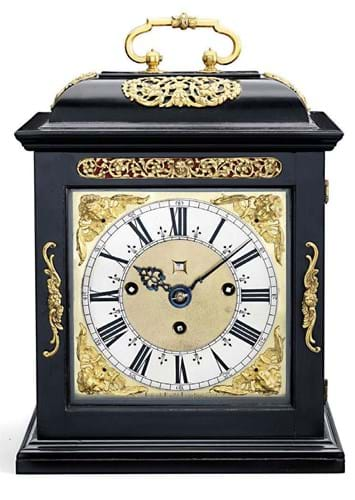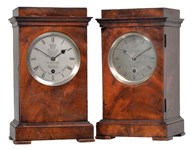
It was c.1675 and the Member of Parliament for Newton, Lancashire, had been shopping for a longcase clock in London.
I went to the famous pendulum maker Knibb, and have agreed for one, he having none ready but a dull stager which was at £19; for £5 more I have agreed for one finer than my father’s, and it is to be better furnished with carved gold capitals, and gold pedestals with figures of boys and cherubs all brass gilt.
“I would have had it olive wood, (the case I mean), but gold does not agree with that colour, so took their advice to have it black ebony which suits your cabinet better than walnut tree wood, of which they are mostly made. Let me have thy advice by the next.”
Elizabeth, replied succinctly: “My dearest soul; as for the pendulum case I think black suits anything.”
Typical of the clocks Richard Legh might have seen when he visited the House at the Dyal in Suffolk Street is this 13in (33cm) ebony table clock c.1685.
…as for the pendulum case I think black suits anything
It has an unusual striking arrangement. As well as a grande-sonnerie, that combines a quarter striking mechanism with a repeater, it also allows for the more economical ‘double six-hour’ striking whereby the first six hours are struck as normal before the clock reverts to striking once at seven o’clock, twice at eight and so on.
The latter was typically more popular on Continental than English clocks. Estimated at £120,000- 180,000, it is among the English Golden Age clocks from the Clive collection to be offered at Bonhams on June.
Auction star
As reported in ATG No 2394, the sale includes one of the most valuable clocks ever to appear at auction: a diminutive quarter-repeating table clock made by Thomas Tompion for Mary II in 1693 that is expected to fetch in excess of £2m.













